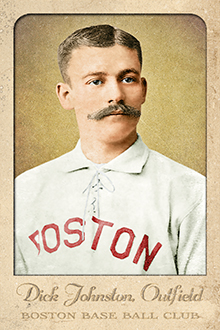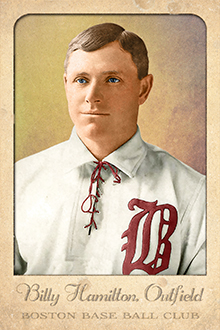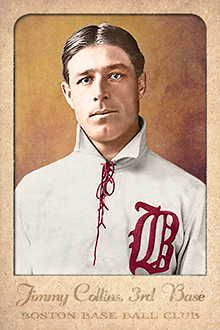- Series: Pioneer Portraits II: 1875-1899
- City: Boston
- Team: Beaneaters
- League: National League
Richard Frederick Johnston (1863-1934) played OF, primarily for the Boston Beaneaters, over an 8-season career. He began with the Richmond Virginians of the AA and last played for King Kelly’s Cincinnati club in 1891. Johnston compiled a .255 lifetime BA with a high of .296 for Boston in ’88, when he led the NL in triples and extra-base hits.
- Led the NL in outfield put-outs in ’86 & ’87
- Turned nine OF double-plays, leading the league in 1887
- Series: Pioneer Portraits II: 1875-1899
- City: Boston
- Team: Beaneaters
- League: National League
- Hall: National Baseball Hall of Fame
William Robert Hamilton (1866-1940). An outfielder for 3 teams over 14 ML seasons, Sliding Billy was an elite hitter & one of the greatest base runners in history. In 1894, Billy scored a record 198 runs. He ranks 4th all-time in OBP (.455) & 3rd in stolen bases. Billy has a career .344 BA & is 1/3 players to avg 1+ runs scored per game.
- 1 of 5 players to hit a lead-off & walk-off HR in same game
- Was a member of Philly all-.400 outfield in 1894 (.404)
- Won 6 NL pennants, 5 as a manager
- Elected to Hall of Fame: 1961
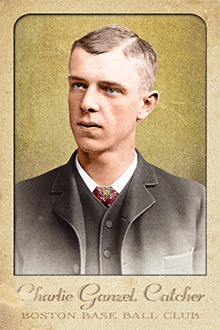
- Series: Pioneer Portraits II: 1875-1899
- City: Boston
- Team: Beaneaters
- League: National League
Charles William Ganzel (1862-1914) was reared in Kalamazoo with nine siblings, part of what would be called the “First Family” of Michigan baseball. Charlie had the longest major league career, 14 seasons, with his best coming with the Wolverines and Beaneaters for whom he served nine years behind the plate. Usually a reliable reserve, Ganzel had to step up when longtime teammate Charlie Bennett lost both legs in a train accident. The duo had moved from Detroit to Boston as part of the then highest-cost foursome sold: $30,000. They had split the duties in 1887 when the Wolverines reached their peak, winning the NL flag and defeating the Browns in the post-season. Charlie’s years in Boston were very productive with three more pennants. A lifetime .259 BA testified to his skill offensively and he was always praised for his defense.
- Brother John saw major-league experience as did son Foster who followed 43 years after Dad’s debut, still the longest gap for father/son major-league debuts
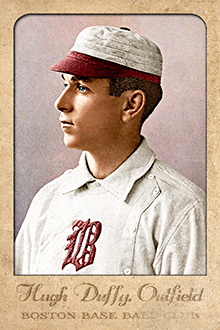
- Series: Pioneer Portraits II: 1875-1899
- City: Boston
- Team: Beaneaters
- League: National League
- Hall: National Baseball Hall of Fame
Hugh Duffy (1866-1954) is as much a baseball institution as the Hall of Fame that enshrines him. For 68 years he devoted himself to the game he loved and excelled at as few ever have. In 1894 he set the all-time mark with a .440 average while winning the triple crown. He made HOF pitchers look like batting practice coaches: .586 against John Clarkson, .650 vs Cy Young. Amos Rusie was the exception, holding Duffy to a mere .333. So diminutive Cap Anson nearly dismissed him (“We already have a bat boy”), Hugh hustled his way to becoming the only player to hit .300 in four leagues and let the power follow his form (“hit ‘em up the middle”) winning two HR titles. Duffy went on to coach, manage, scout and mentor for a half-century after hanging up his spikes. He was still hitting fungoes eight years after his induction into Cooperstown and delighted in pupil Ted Williams’ success as he sought in vain to eclipse Duffy’s record in 1941.
- Playing career spanned 19 years, primarily in Chicago, Boston and Philadelphia
- Played center field for the Beaneaters next to his “Heavenly Twin,” Tommy McCarthy in right, leading Boston to a pair of pennants
- Elected to Hall of Fame: 1945
- Series: Pioneer Portraits II: 1875-1899
- City: Boston
- Team: Beaneaters
- League: National League
- Hall: National Baseball Hall of Fame
James Joseph Collins (1870-1943) was the best in the NL at 3B when he jumped to the new AL in 1901. Collins led the Boston Americans to the 1st World Series championship in ’03, downing Pittsburgh in best-of-nine. Thanks to John McGraw’s stubborn refusal to play the next year’s AL winner, Boston was denied another opportunity despite its 1st place finish.
- The dust-up between leagues resulted in rules beginning in 1905 making the Series the permanent premier event in Major League Baseball
- Upon his induction into the HOF Collins became the first regular third-baseman so honored
- Elected to Hall of Fame: 1945
